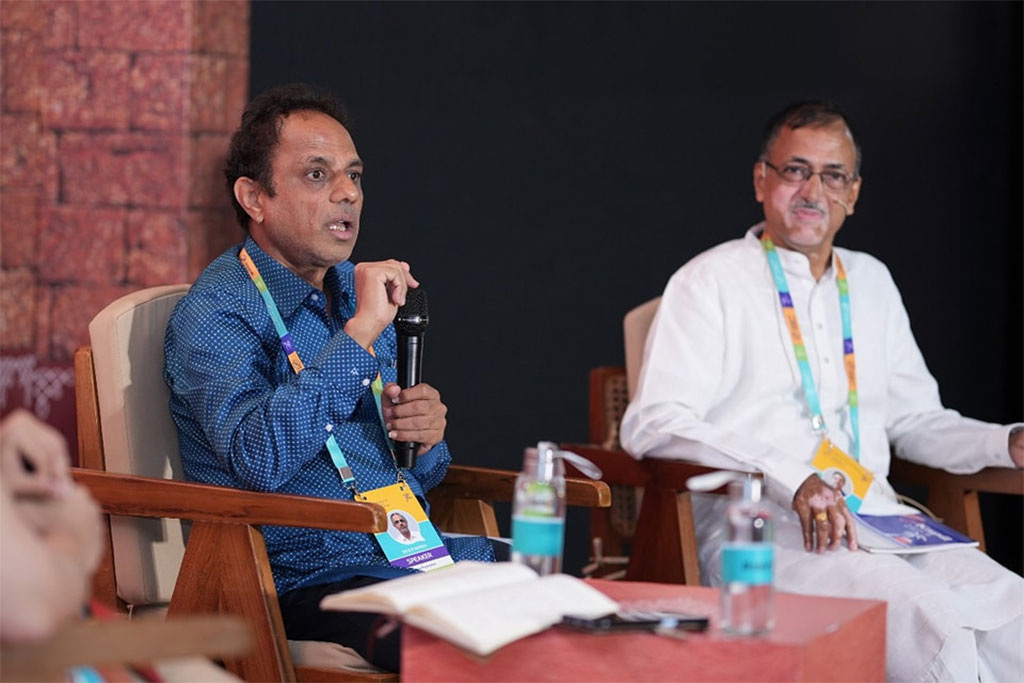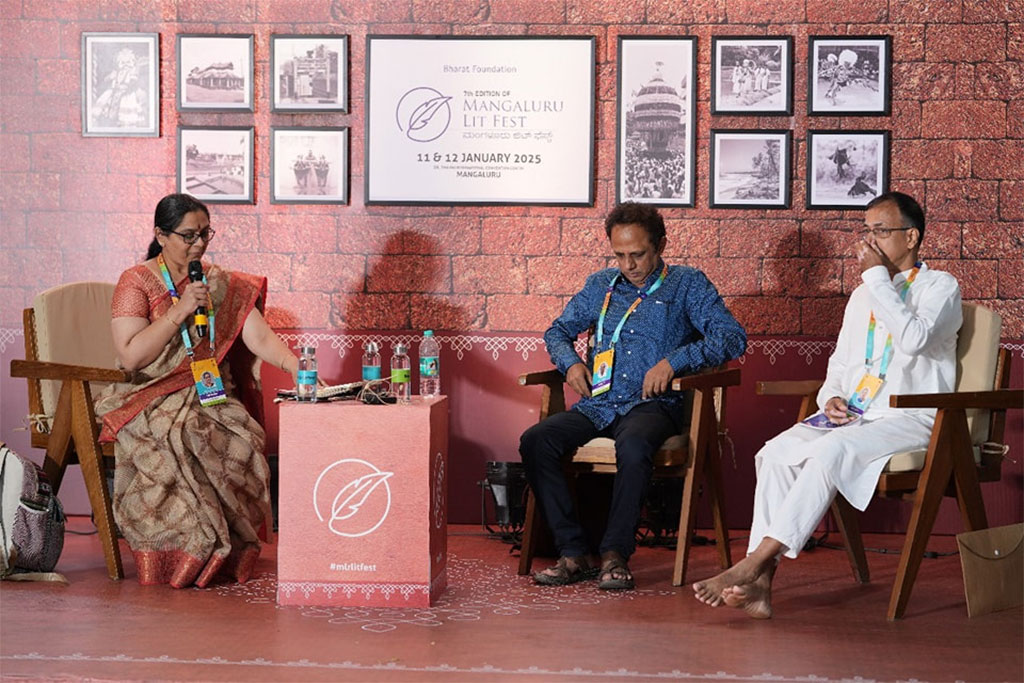Day 2 | Audi 1 – Session 6 : 4.00 pm
ಡಾ. ಜಿ. ಬಿ. ಹರೀಶ, ಡಾ. ಹೆಚ್. ಆರ್. ವಿಶ್ವಾಸ್ ಮತ್ತು ಕ್ಷಮಾ ನರಗುಂದ
ಚರ್ಚೆಯಲ್ಲಿ ಲೇಖಕ ಮತ್ತು ಪತ್ರಕರ್ತ ಡಾ. ಜಿ.ಬಿ. ಹರೀಶ್ ಮತ್ತು ಕನ್ನಡ-ಸಂಸ್ಕೃತ ಪಂಡಿತ ಡಾ. ಹೆಚ್.ಆರ್. ವಿಶ್ವಾಸ್ ಭಾಗವಹಿಸಿದ್ದರು.
ಭಾರತದಲ್ಲಿ ಸ್ಥಳೀಯ ಭಾಷೆಗಳ ಪಾತ್ರ, ಭಾರತದ ಭಾಷಾತ್ಮಕ ಹಾಗೂ ಸಾಂಸ್ಕೃತಿಕ ಪ್ರಾತಿನಿಧ್ಯತೆಯ ರೂಪಚೇತನೆಯನ್ನು ವಿಶ್ಲೇಷಿಸಲಾಯಿತು. ಶತಮಾನಗಳಿಂದ ಸ್ಥಳೀಯ ಭಾಷೆಗಳು ಭಾರತೀಯ ಪರಂಪರೆಯನ್ನು ಹೇಗೆ ಕಾಪಾಡಿ-ಅಭಿವೃದ್ದಿಗೊಳಿಸಿವೆ ಎಂಬುದರ ಬಗ್ಗೆ ಪ್ರಮುಖ ಅಂಶಗಳನ್ನು ಪ್ರಸ್ತುತಪಡಿಸಲಾಯಿತು.


ಡಾ. ಜಿ.ಬಿ. ಹರೀಶ್, ಭಾಷೆ, ಸಂಸ್ಕೃತಿ ಮತ್ತು ಭೂಗೋಳಶಾಸ್ತ್ರದ ಅಂತರಂಗ ಸಂಬಂಧವನ್ನು ವಿವರಿಸಿದರು. ಭೌಗೋಳಿಕ ಕಾರಣದಿಂದಲೂ ಸಂಘರ್ಷಗಳು ಉದ್ಭವಿಸುತ್ತವೆ. ಅದಕ್ಕೆ ಉದಾಹರಣೆಯಾಗಿ ಶಿವಾಜಿ ಗಣೇಶ್ ಾವರ ಉದಾಹರಣೆಯನ್ನು ನೀಡಿ ಪ್ರಾದೇಶಿಕತೆ ಹೇಗೆ ದೇಶವನ್ನು ನಾಶಮಾಡುವ ಶಕ್ತಿ ಹೊಂದಿದೆ ಎಂದು ವಿವರಿಸಿದರು. ಸುದ್ದಿ ಅಥವಾ ಚರ್ಚೆಗಳು ಹೆಚ್ಚಾಗಿ ಸ್ಥಳೀಯ ಮಟ್ಟದಲ್ಲಿ ಮಾತ್ರ ಸೀಮಿತವಾಗುತ್ತವೆ.
ಡಾ. ಹೆಚ್.ಆರ್. ವಿಶ್ವಾಸ್ ಸಂಸ್ಕೃತ ಭಾಷೆಯ ಏಕೀಕರಣದ ಶಕ್ತಿ ಬಗ್ಗೆ ಬೆಳಕು ಚೆಲ್ಲಿ, ಇದು ದೇಶದ ಭಾಷಾ ವೈವಿಧ್ಯತೆಯಲ್ಲಿಯೇ ಒಂದು ಅತಿದೊಡ್ಡ ಸಂಘಟಕ ತಂತುವಾಗಿದೆ ಎಂದು ವಿವರಿಸಿದರು. ಭಾರತದ ಭಾಷಾ ವೈವಿಧ್ಯತೆ ನಮ್ಮ ಪರಂಪರೆ ತೋರಿಸುತ್ತದೆ. ಆದರೆ ಸಂಸ್ಕೃತವು ದೇಶಾದ್ಯಾಂತ ಇರುವ ಪ್ರಾದೇಶಿಕ ಭಾಷೆಗಳನ್ನು ಶ್ರೀಮಂತವಾಗಿಸಿದೆ. ಸ್ಥಳೀಯ ಭಾಷೆಗಳು ಭಾರತದ ಭಾಷಾ ಪರಂಪರೆಯನ್ನು ಕಾಪಾಡಲು ಮತ್ತು ಒಗ್ಗಟ್ಟನ್ನು ಪ್ರದರ್ಶಿಸಲು ಹೇಗೆ ಸಹಾಯ ಮಾಡಬೇಕೆಂಬುದರ ಮಹತ್ವವನ್ನು ಹೇಳಿದರು.
ಕ್ಷಮಾ ನರಗುಂದ ರವರು ಸಂವಾದ ಕಾರ್ಯಕ್ರಮ ನಡೆಸಿಕೊಟ್ಟರು.
The 7th edition of the Mangalore Literature Festival hosted an engaging session on the theme, “Contributions of Vernacularity to Indian Languages.” The session featured two distinguished speakers, Dr. G.B. Harish, a writer and journalist, and Dr. H.R. Vishwas, a noted Kannada and Sanskrit scholar. The discussion was moderated by Kshama Nargund.
The speakers explored the role of regional languages in shaping the linguistic and cultural identity of India, emphasizing how vernacular languages have preserved and enriched Indian traditions over centuries. Dr. G.B. Harish highlighted the intrinsic link between language, culture, and geography, arguing that these elements form the foundation of rationality and identity. He noted, “Conflicts often arise from localized narratives, as news and discussions seldom transcend geographical boundaries. This limits the scope for broader dialogues or debates across regions.”
Dr. H.R. Vishwas shed light on the unifying role of Sanskrit, describing it as a linguistic thread binding the nation despite its linguistic diversity. He remarked, “India’s multiplicity of languages reflects its rich heritage, yet Sanskrit remains a unique constant across the country. While words might remain consistent, their meanings can change across different regions and contexts.”
The session emphasized the importance of vernacular languages in preserving India’s linguistic heritage while fostering a sense of unity amidst diversity. It also underscored the challenges of ensuring cross-regional dialogue and understanding in a linguistically diverse nation like India.
The audience appreciated the session for its insightful perspectives on vernacularity’s contribution to India’s linguistic and cultural legacy.
